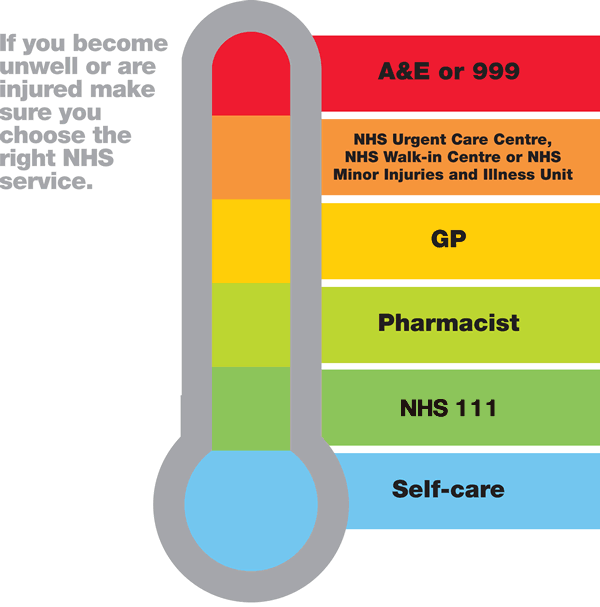Have you tried self-care?
Every year, millions of us visit our GP with minor health problems that can be easily resolved without a doctor's appointment.
It is estimated that 50 million visits to GP Surgeries are made annually for minor ailments such as coughs and colds, mild eczema, and athlete's foot. By utilising other avenues such as self-care and visiting your pharmacy instead, you could save yourself time and trouble and reduce pressure on NHS services.
Check your symptoms on the NHS 111 website or the NHS App
The NHS A-Z of Health and the NHS 111 symptom checker will help you decide if you can use self-care or if you need to see a clinician.
The symptom checker is also available in NHS app - a simple and secure way to access a range of NHS services on your smartphone or tablet. You can use the app to:
- check your symptoms
- get instant advice
- book appointments
- order repeat prescriptions
- view your GP medical record and more.
The NHS App is free to download from the Apple Store and Google Play.
Try using AccuRx for advice
You can find lots of advice on self-care and treating minor ailments and injuries using the self-help advice on our triage and remote consultation tool AccuRx.
Use the AccuRx system to find out what your symptoms mean, what you should do, when to get medical advice and who you need to see. If you want to know more about a specific condition, you can learn about:
- causes of your condition
- treatments
- prevention
- outlook
- support groups
You are able to search by symptom or topic, view a list of: All Conditions, A-Z, for your child; there is even a body map where you can click on the part of the body where you have a problem and find out more about possible conditions.
Can you treat yourself at home?
A well stocked medicine cabinet can treat many day to day illnesses. Small doses of paracetamol or ibuprofen for example can treat many common illnesses such as colds, sore throats and coughs. It is possible to purchase many medicines from the chemist without a prescription. Always follow the instructions on the medicine label and consult your doctor if the illness continues or becomes more severe.
Have you spoken with your pharmacist?
Pharmacists offer professional free health advice at any time - you don't need an appointment. From coughs and colds to aches and pains, they can give you expert help on everyday illnesses. Your pharmacist can also advise on what you might find useful to keep in your medicine cabinet.
Pharmacists can also advise on healthy eating, obesity and giving up smoking. Some pharmacists have private areas where you can talk in confidence. They may suggest you visit your GP for more serious symptoms.
Have you tried calling NHS 111?
NHS 111 is a 24 hour a day health information and advice service staffed by professional health advisers and nurses. They offer free, confidential advice on what to do if you are ill, and provide information on a range of conditions and services, and can put you in contact with your local health, self-help & support organisations and refer you to your out-of-hours doctors service when your surgery is closed.
Ring NHS 111 by dialling 111. Calls are free from landlines and mobile phones.
Do you need to see a GP or other healthcare professional?
Sunray Surgery offers a range of NHS funded medical services. These include general medical advice and treatment, prescriptions, referral services and a range of tests and immunisations.
Remember to tell your doctor if you have tried, or are still taking, any self-care remedies.
Do you need a walk-in centre or urgent treatment centre?
Before going to A&E consider if you would get the right treatment at an urgent care centre or walk-in centre. NHS Walk In Centres treat around 3 million patients a year and have proved to be a successful complementary service to traditional GP and A&E services. Some centres offer access to doctors as well as nurses. However, they are not designed for treating long-term conditions or immediately life-threatening problems.
Hospital emergency department (A&E)
A&E departments assess and treat patients who have serious injuries or illnesses. You should visit A&E or call 999 for emergencies if you have a medical emergency that cannot be treated by the surgery, the Walk-in-Centre or the Out of Hours Service. Examples of conditions where you should attend A&E are:
- loss of consciousness,
- pain that is not relieved by simple analgesia,
- acute confused state,
- persistent, severe chest pain, or
- breathing difficulties.
If you're injured or seriously ill, you should go, or be taken, to A&E situated at Southampton General Hospital. If an ambulance is needed you can call 999, the emergency phone number in the UK. You can also dial 112, which is the equivalent for the European Union.
Major A&E departments offer access 365 days a year and usually open 24 hours a day. Be aware that not all hospitals have an A&E department.


